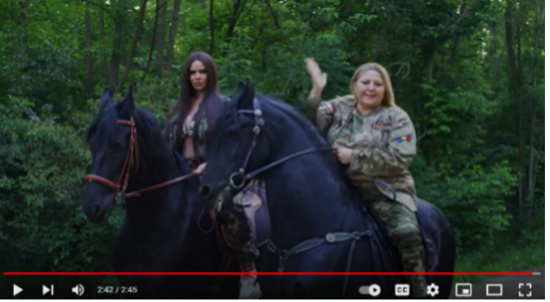Camil Ungureanu and Delia Dumitrica examine the phenomenon of Diana Șoșoacă, Romania's new far-right leader, self-styled strongwoman, and TikTok influencer. While the populist right tends to champion traditional gendered roles, Șoșoacă is crafting fresh gender images that resonate with female voters
On 24 July 2024, Diana Iovanovici-Șoșoacă, leader of the new far-right party S.O.S. Romania, made global headlines. In traditional attire, and with a muzzle covering her face, Șoșoacă confronted the newly convened European Parliament, shouting 'In God we trust!' and calling for a priest to exorcise it.
Already notorious for polarising interventions in the Romanian Parliament, Șoșoacă joins a growing group of female populist leaders in Europe. Like their male counterparts, such self-styled strongwomen often rely on radical performative styles in the absence of ideological substance. But Șoșoacă also presents herself as an advocate for women’s rights and as 'the first female leader' in post-communist Romanian politics. Her gender appeals, however, clash with the anti-feminist politics of the populist right.
So, how can a female populist politician present herself as a 'strong leader' while still advocating for traditional gender roles? To explore this paradox, we analysed 30 of Șoșoacă’s most popular TikTok videos, which have amassed over 21 million views.
A former lawyer, Șoșoacă entered politics in 2019 as a member of far-right Alliance for the Union of Romanians (AUR). Following internal tensions, in 2021 Șoșoacă split from AUR to found the S.O.S. Romania Party. In so doing, she became the first female leader of a far-right party in Romania.
Șoșoacă opposed Covid-19 measures, including vaccines, pushed conspiracy theories, and adopted a pro-Russian stance on Ukraine
Over time, Șoșoacă's political positions have grown increasingly radical. She opposed Covid-19 containment measures, including vaccines, pushed conspiracy theories, and adopted a pro-Russian stance on Ukraine. Șoșoacă's stances led the Romanian Constitutional Court to ban her participation in the November 2024 presidential elections. Nevertheless, in the 2024 European elections, her party secured the fourth spot in Romania, propelling Șoșoacă onto the international stage of populist far-right politics.
In the Romanian and EU Parliament, Șoșoacă frequently records herself live. She shouts into her phone camera and angrily name-calls national and international political figures. Yet her party’s sketchy manifesto is only a few pages long.
Șoșoacă’s performative politics directly addresses voters through her TikTok account, where she posts videos of her official interventions and daily life. Videos subvert parliamentary debate, transforming it into a reality show in which Șoșoacă's politics of shouting gives expression to people’s anger and grievances. Her carnivalisation of politics, which turns the democratic process upside down, sparks trends on social media and attracts continuous news coverage.

'The Democratic Union of Hungarians in Romania are trying to undo Romania. Incitement to a coup d'état!'
@diana.i.sosoaca.official, 29 December 2023
Șoșoacă's TikTok uses popular culture and folk tradition to make politics entertaining, and to reverse inherited gender imagery. In one video, she collaborates with a local female singer to produce a song-manifesto portraying Șoșoacă as a mighty warrior and saviour of the people, ready to take on the 'corrupt elite'. Here Comes Șoșoacă! draws heavily from the often-vulgar musical genre manele, associated with the 'lower classes'. Șoșoacă is signalling that she is fighting for the common people but also that she is one of them. The song goes:
Here she comes with the Amazons / Let’s go to the revolution! / […] Șoșoacă is coming to destroy the cesspool!
In Șoșoacă's musical call for a 'revolution', men are notable by their absence. She surrounds herself with hypersexualised women who blend traditional Romanian attire with military clothing. These Amazons are meant to affirm female power, with Șoșoacă herself the leader. The video ends with Șoșoacă angrily slicing the air with her hand, shouting: 'Up to here! No more! It's enough!'


In Parliament and on TikTok, Șoșoacă is bold and angry – a female 'avenger'. Drawing on pop-culture references like Xena, Warrior Princess, and Wonder Woman, she appears to champion female empowerment. In a male-dominated political landscape, her performances feel subversive, giving her rebellion novelty and authenticity. Yet, Șoșoacă navigates expertly between novel political imagery and traditional gender roles.
Șoșoacă portrays herself by turns as a strong revolutionary, a nurturing mother, and a savvy professional
She shifts personas effortlessly, portraying herself by turns as a strong revolutionary, a nurturing mother, and a savvy professional. In some TikTok videos, she taps into conservative family values or offers protective support to the 'less fortunate'. Șoșoacă studied law at university, and she uses her legal skills to hold political elites accountable to the people. While her professional references don’t always relate to gender, they contribute to her image as a salvationist female leader.
Far-right parties usually fall into one of three groups: European Conservatives and Reformists, Identity and Democracy, and unaffiliated. Now, far-right parties represent the second-largest force in the European Parliament. Șoșoacă herself is unaffiliated. While this limits her influence in European politics, her spectacular performances align well with the dynamics of news and social media.
These performances blend 'women’s power' with populist themes and irreverent bursts of anger – and this resonates with sections of Romania's population disenchanted by the failure of post-communist democracy to deliver equality and prosperity. However, Șoșoacă’s rebellious performances coexist with inegalitarian and gendered traditionalism.
Moreover, Șoșoacă’s self-projection as a strong woman, along with her appropriation of feminist themes, mirror the aggressive populist-strongman archetype. These ambiguities enable her to appeal to a broad audience, uniting those yearning for a return to traditional values with those drawn to protest and anger politics. Ultimately, Șoșoacă’s engagement with feminist themes and protest movements aligns her with conventional anti-feminist politics.